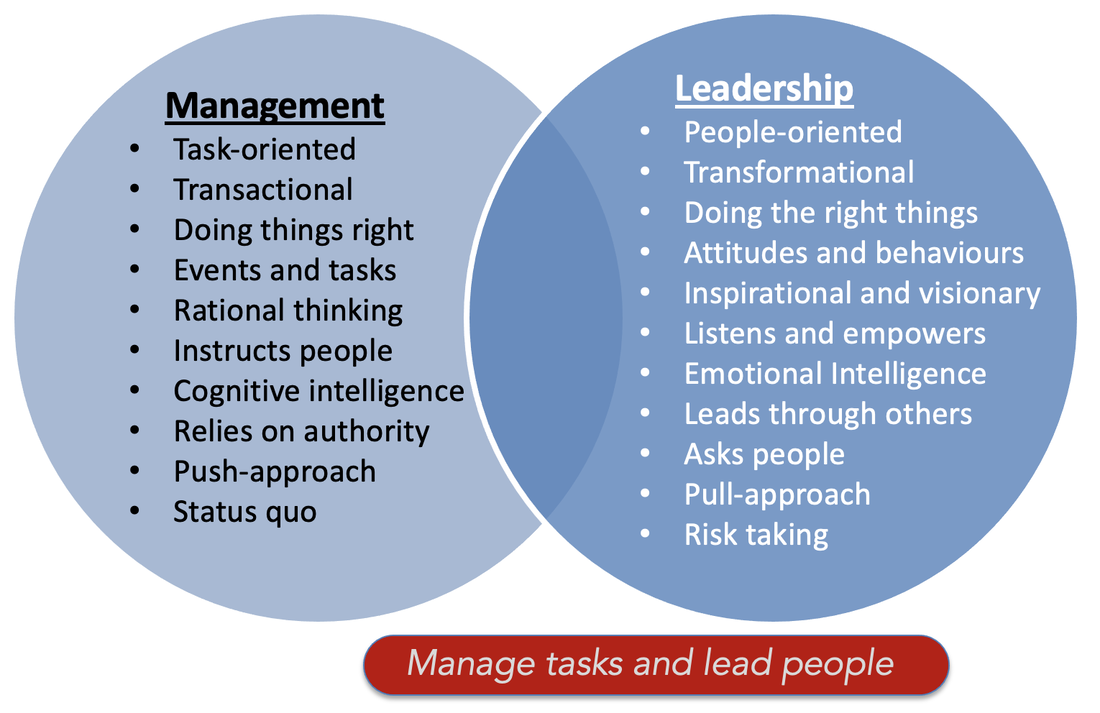Managers rely on authority, leaders on influence
One of the main differences between management and leadership is the way in which the two disciplines motivate people and teams to achieve objectives. Managers rely on their authority to get work done. They allocate tasks to team members based on what needs to get done and expect them to carry out their job, by and large because they receive a salary for it. Leaders, on the other hand, influence, inspire and appeal to people at an individual level. They strive to get the best out of people by aligning each person’s individual objectives to those of the project and organization. You could say that managers use a push approach whereas leaders use a pull approach.
Leaders have a high level of emotional intelligence
The differentiating factor between management and leadership isn’t the level of cognitive ability or technical skills that someone has – it is to a large extent their level of emotional intelligence (EQ). Managers may have a high level of cognitive intelligence or IQ, but not necessarily EQ. They may be good at implementing effective management systems, but they aren’t necessarily good at communicating change or bringing people with them. Leaders are skilled at understanding, motivating and influencing people. They keep their emotions in check and set a great example for others to follow. Because of their people skills, their approach is often described as transformational rather than transactional. These leaders are able to build strong relationships with others, whereas people with low EQ may be socially out of touch and have problems working in teams due to their individual behaviours.
It’s difficult to imagine a great leader who doesn't have a high level of emotional intelligence. Think about some of the leaders or role models you have worked with over the years. Would you agree that they have something over and above cognitive intelligence?
Can project managers learn to lead?
Many project managers come from a technical background and have a rational, logical and analytical way of thinking. It means that they are good at analyzing facts, calculating duration, coordinating activities and making rational decisions. They are task-focused and concerned with getting things done. They see their primary role as delivering what the customer has asked for within the agreed parameters of time, cost and quality. They are less concerned with why their customer needs the product and in which ways it affects their business and the people who develop it and use it. Their strength is in executing someone else’s vision rather than defining it.
There is nothing wrong with being logical and task-oriented. As project managers we need those skills, especially when planning and estimating a large project. Being good at management isn't a bad thing. The issue arises when this is the only style in the toolbox, which is then being used to also manage people and communicate with customers. Project managers need both disciplines. We need to manage tasks and lead people. Building high performing teams, great customer relationships and ensuring that the project actually delivers what the customer needs cannot be achieved solely through logic. It requires creativity, empathy, risk-taking, vision and most importantly the ability to connect with people at a very personal level.
The good news is that leadership can be learnt. In contrast to IQ, our level of EQ is never set. Emotional intelligence is a flexible skill set that can be learned and improved upon at any age. To find out more about how to develop your project leadership skills, get hold of the The Power of Project Leadership, now in 2nd edition.
If you liked this post, you may also like:
What makes a high performing team?
Why having a clear vision is key to project success
My Story – Working Smarter; Not Harder!
7 steps to building a collaborative plan
The yin and yang of project leadership









 RSS Feed
RSS Feed